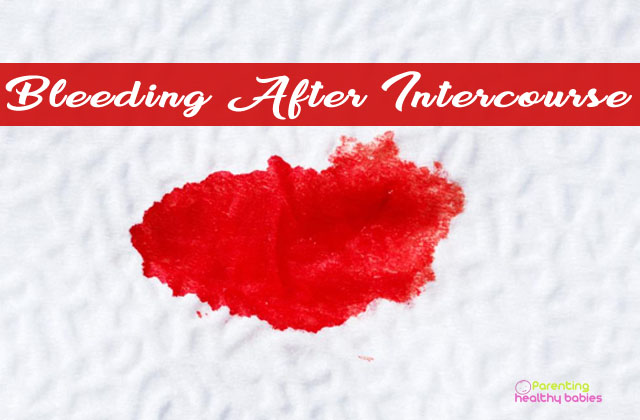Among women, most of them tend to experience “postcoital bleeding” or what is popularly called bleeding after sexual intercourse, at some point in their sexually active period. Researchers say that more than 60% of the post-menopausal women and about 10% of the menstruating women occasionally experience this situation. While this bleeding might be caused due to an array of factors, ranging from mild to more serious, you should be aware of what is causing you to bleed from your reproductive area. If the bleeding persists, it should be a cause enough to worry about and visit the doctor as soon as possible. To be able to receive the proper kind of treatment for postcoital bleeding, you must be aware of its causes and risk factors. Bleeding can occur from the uterus, urethra, cervix, or labia. The most common causes for you to bleed after intercourse are:
Bleeding After Intercourse: Causes, Symptoms and When to see a doctor
Vaginal dryness
One of the most common and almost harmless causes of bleeding after intercourse is dryness in the vagina due to lack of appropriate foreplay or lack of proper arousal. Make sure that you engage in foreplay for quite some time before the actual act of penetrative sex. Vaginal dryness can also occur among new mothers right after childbirth or due to regular breastfeeding. One god way of getting wet down there is asking your partner to perform oral sex on you.
Polyps
Although this is not quite harmful, you must however detect the possible growth of tiny pearl-like developments inside your vaginal tract, if you experience postcoital bleeding all of a sudden. Polyps can also grow around the cervix and/or the endometrial lining in the uterus. They are not fatal but still need to be treated in time.
Vaginal infections
There are various kinds of infections that can develop inside the vagina, without you even knowing of them as they do not quickly show up in terms of plausible symptoms. But, if you see that you are bleeding after intercourse, consider these infections as some of the possibilities behind the blood stains. Vaginitis is one of the most common infections to look out for.
Genitourinary syndrome of menopause
This is a common condition among women who are almost in their menopausal stage or are in the stage of perimenopause. This also happens when you surgically remove your ovaries. In both the cases, your body reduces its production of oestrogen, the sex hormone required to drive your libido and lubricate your internal parts. It usually lasts for a while until your body gets accustomed to the change. But if you continue to experience postcoital bleeding for a long period of time, consult your gynaecologist to see if external medication can be used.
Vaginal tearing
During menopause, as the body produces less quantity of oestrogen, the dryness inside your vagina causes more friction between the tissues and causes them to tear. This, however, also happens during the breastfeeding period when your vagina becomes exceptionally dry. Try to use natural or organic lubricants to enable a smoother insertion of the penis.
Cancer
If you continue to experience bleeding after sexual intercourse even when you are not going through menopause or when you are not breastfeeding, you must visit the doctor and get a pap smear done. If this is also accompanied by irregular periods, the doctor will most likely recommend a test for cancer of the cervix, uterus, ovaries, or the vagina.
Even women who are perfectly fine in terms of their reproductive health can experience vaginal bleeding after intercourse due douching very often. Douching distorts the natural pH level of your vagina. Doctors say that vaginas are self-cleansing and need not be rubbed clean. Just water and at times mild cleansers that are medically approved, can be used.
Most doctors say that bleeding at times is normal and does not require immediate attendance if there are no unusual occurrences or symptoms. You must keep a tab on the symptoms that might indicate that you have to visit the gynaecologist. The most common signs telling you that something is wrong with your reproductive system as a whole are:
- Itching in or around the vagina
- Burning sensation inside the vaginal tract
- Painful penetration every time
- Too much vaginal bleeding
- Abdominal cramps
- Feeling nauseous very often
- Lower back ache
- Too much vaginal discharge with an unusual odour or colour
When you visit the gynaecologist after experiencing some or even one of these symptoms, be ready to face questions that might be intimate as the doctor will inquire into your sexual habits. You must be precise in what you say. There is no need to feel shy because it will only make things worse as based on what you say, the doctor will recommend the appropriate medical tests.
Depending on your response, the doctor might prescribe a physical examination to detect the source of the postcoital bleeding. The major tests thereafter, to determine the exact reason for the blood stains after intercourse will be:
- A pap smear for detecting carcinogenic growth in your reproductive area
- A pregnancy test to see whether a process of conception has gone wrong in any way
- A series of vaginal cultures to look into the development of potential STDs
After the related tests are done, you will be medically guided by the doctor with regard to the reason behind the bleeding. In most cases, when the reasons are not fatal and just regular aberrations, you will be advised to take some precautions for prevention of further postcoital bleeding. The major precautionary steps involve:
- Using latex condoms that can be well lubricated before insertion
- Using natural lubricants
- Pepping up your diet to include foods that boost your libido, so that it is easier for you to get ‘wet’
- Allotting enough time for foreplay
- Drinking ample water to make sure that your system is well hydrated
Keeping the essential precautionary methods in mind and adhering to what the doctor says, can help you recover from whatever is causing the postcoital bleeding. There is no need to worry about your sex life as long as you visit the doctor for regular check-ups and keep the health factors under control!













